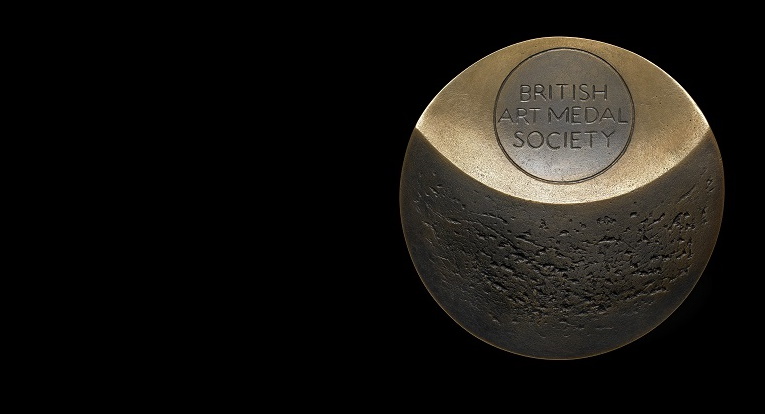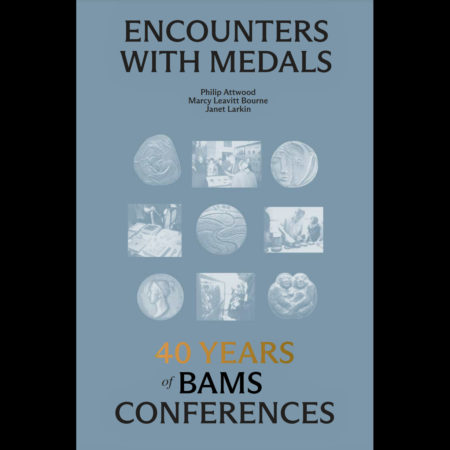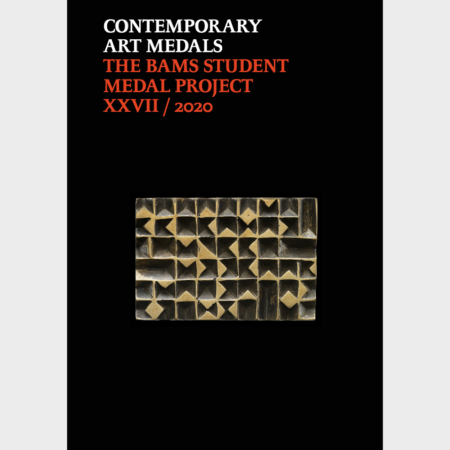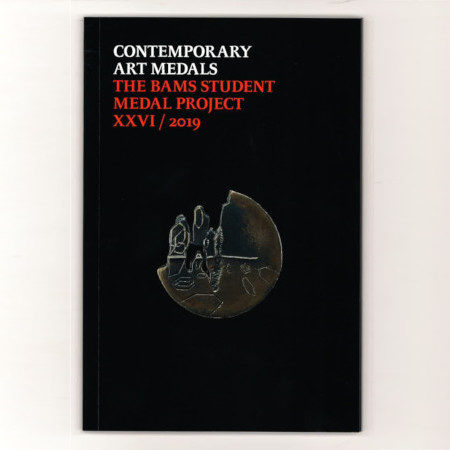One of the aims of BAMS is to encourage an appreciation of the art of the medal through a variety of educational projects. Various members of the society have utilised techniques to create workshops that are suitable for a wide age range. These have been held in many schools, junior and senior, and in venues such as the British Museum and National Gallery. More advanced work has been undertaken for colleges such as the Royal College of Art and a major initiative, the Student Medal Project, was established in 1993.
The New Medallist Scheme, run since 2005, encourages artists freshly graduated to develop their interest in the art of the medal. The society also organises regular lectures and an annual conference.
Student Medal Project
The Student Medal Project encourages and promotes the art of making medals throughout art colleges in the United Kingdom. Each year over one hundred student medals, from as many as fifteen art colleges, are submitted for judging for prizes and selection for exhibition.
The Worshipful Company of Founders, The Worshipful Company of Cutlers, The Worshipful Company of Tin Plate Workers, The Goldsmiths’ Centre and Thomas Fattorini Ltd are among the institutions that support the project, and the British Museum sometimes purchases particularly meritorious student medals.
It is a wonderful forum for students to view the work made by their contemporaries, to join them at the annual conference, and to participate in an international project. Each year an academy from outside the UK is invited to take part.
As an introduction to bronze casting, the project is perfect for the college curriculum. The Society often provides a speaker to introduce it in the first year. It is particularly geared to sculpture students and those studying metalwork and jewellery, but is open to other disciplines as well. A catalogue is published, which includes entries for everyone who participates and stands as a record for those at the start of their artistic careers.
BAMS Student Medal Project 2023 prizes and awards
MODERN ART MEDALS : Making History in 30 years
The 30th anniversary of the BAMS Student Medal Project has resulted in the largest ever exhibition, open at Central Saint Martins in Granary Square until 9th May 2023. Students from 21 British colleges and one from Germany produced a total of 175 medals, including ten that won prizes. There are medals also by teachers and by BAMS New Medallists. While there is no specific theme, students made medals that comment on the environment, migration and society and politics, as well as personal interests.
BAMS Student Medal Project 2022 prizes and awards
The 29th year of the Student Medal Project, and a record twenty UK colleges/universities participated plus the invited university, Pforzheim, in Germany, resulting in 148 UK student works with 12 from Germany (plus a number of works by teachers). Results of the judging were announced on 28th February 2022. The British Art Medal Society congratulates you all; the standard was very high and the art of the medal is alive and well and absolutely flourishing here. No other country has seen such accomplishment by student artists, in terms of learning the skills connected to the bronze casting of contemporary art medals. Thanks particularly to the Goldsmiths’ Centre for financial support in administering the Project. To see the full list of winning medals and awards read our post on the Noticeboard
BAMS Student Medal Project 2021 prizes and awards
https://issuu.com/marcyleavittbourne/docs/bams_student_medal_project_catalogue_2021_issuu
The 28th British Art Medal Society Student Medal Project announced its winners on 10th April 2021, after a hard year of lockdowns and difficulties at the art colleges all over the UK. Nevertheless, 14 UK colleges, plus 1 from Bulgaria, participated, creating one of the most accomplished results the judges have seen. An additional category called Design/Prototype was created for this year when foundries were closed, and this resulted in a First Prize winner from Cardiff Metropolitan, whose design was called ‘Black Hair Matters’: Bethan Grace Mason took up one suggested theme of Black Art Matters and researched an age-old/modern art form that exists among women, which speaks of identity and cultural belonging. In the category of cast bronze medals – from a total of 74 – Kiki Birtles of Falmouth University won the Grand First Prize with her medal called ‘Inherited’, a narrative on two sides that examines the feelings of a younger generation that has inherited a threatened planet, but has hopes of great achievements.
The Student Medal Project is supported by the Goldsmiths’ Centre, the Worshipful Company of Founders – which gives the Grand First Prize of £1000 – and the Worshipful Company of Tin Plate Workers alias Wire Workers; Thomas Fattorini Ltd gives the Grand Second Prize of £500; The Worshipful Company of Cutlers, Pangolin Editions, G W Lunt and others provide provide further prizes for Design/Prototypes and cast medals.
Director, Marcy Leavitt Bourne
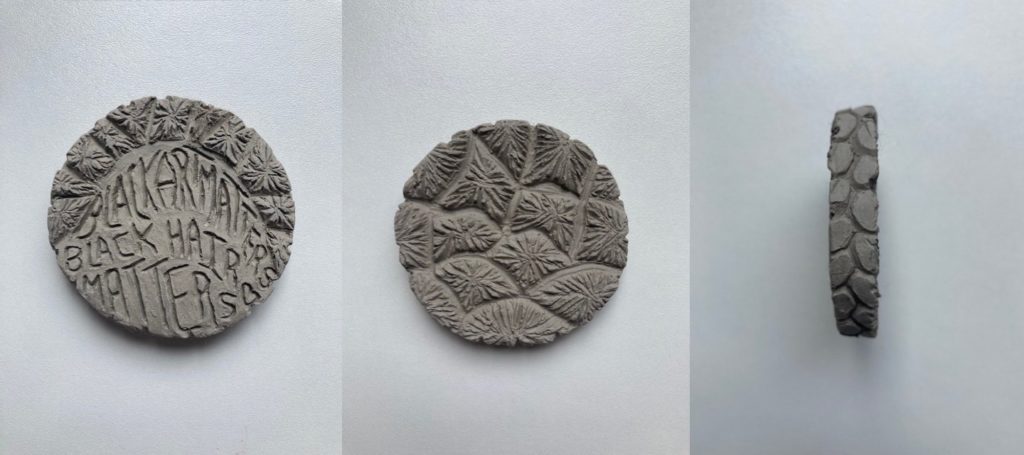
To See Booklets And Catalogues Relating To The Student Medal Project
Click Below
New Medallist Scheme
UPDATE : The ‘New Medallist’ Scheme for 2023
Applications are now CLOSED
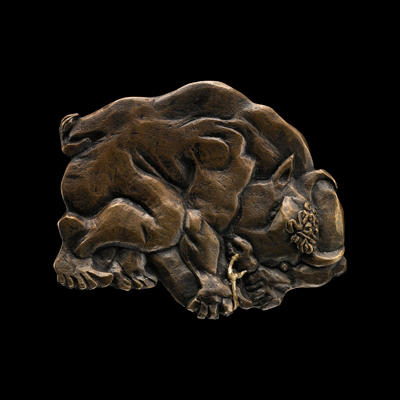
Applications have now CLOSED for 2023 for the British Art Medal Society ‘New Medallist’ scheme, (details below included for information only) an initiative entering its seventeenth year. This scheme is intended to provide a framework by which artists based in Great Britain and Northern Ireland, and who are relatively new to medal-making, can develop their interest in the medal as a vehicle of artistic expression. Its aim is to deepen and broaden the selected artist’s knowledge of the medal and to expand their awareness of the medium’s possibilities.
The scheme is administered by the British Art Medal Society (BAMS). It is funded by the Belvedere
Trust and supported by the British Museum. For more about BAMS, see our About Us page here at
www.bams.org.uk
Previous ‘New Medallists’ have gone on to receive medal commissions, win awards for their medals,
and participate in art medal events in the UK and abroad. Their medals have been acquired by public
collections and private collectors.
Each year one artist is selected for the scheme. Artists eligible for the scheme:
- will have left art college (at whatever level, i.e. BA, MA, PhD or equivalents) within 3½ years of the commencement of their participation in the scheme (that is, since February 2020) or be about to leave college before September 2023.
- will generally have shown an interest in medal-making and had some experience of it while at college. (This may have been through the BAMS Student Medal Project or in some other way.)
The selected artist will receive:
- a grant of £3,500 (see below for conditions).
- a place in a medal-making course at a college abroad or an international medal workshop (to be selected by BAMS), allowing the artist to participate for two to three weeks in a contemporary medal-making environment and thereby gain a greater understanding of contemporary thinking on medals.
- mentoring sessions with an experienced UK-based medal-maker appointed by BAMS (a minimum of three sessions and, if more are needed, the number to be agreed between the mentor and the artist).
- approximately one week’s work experience with a working mint (this may be with the Royal Mint or with a private mint), where the artist will work (either in person or remotely at the mint’s discretion) with experienced medal-makers and be encouraged to experiment with various techniques and receive feedback on any design projects which may be set.
- access to a foundry for a session to learn about casting and patination.
- access for one week to the medal collections of the British Museum and/or Victoria and Albert Museum under the supervision of a curator, enabling the artist to gain a greater understanding of the medallic tradition by studying historical medals from the Italian Renaissance to the twenty-first century.
- free membership of BAMS for one year.
- free attendance at a BAMS weekend conference.
Within twelve months (starting 1 September 2023) the artist will be expected to devote not less than nine weeks to medal-related activities. (These nine weeks are not necessarily to be taken in one block but may be split over the twelve-month period, as agreed between the artist and BAMS.) Within these nine weeks the artist is expected:
- to attend a medal-making course at a college abroad or an international medal workshop (for two to three weeks), to gain work experience with a mint (approximately one week), and to study the British Museum and/or Victoria and Albert Museum medal collections (one week), all as mentioned above.
- to devote a further four weeks to building up a portfolio of medallic ideas.
- to attend mentoring sessions (for which the artist will be expected to prepare effectively).
- to attend a BAMS conference.
- to attend BAMS lectures whenever possible.
- to produce a visual record of research and finished work resulting from participation in the scheme.
- to produce at least one medal, for which all costs will be met by the artist. (One of these works may go on to become a medal issued by BAMS and at least one will be featured in The Medal, the society’s journal.)
- to produce a report of about 500 words on the artist’s experience of the scheme, for retention by BAMS.
The principal expenses of the artist, which are to be met from the £3,500 grant, are:
- travel to and accommodation in another country for two to three weeks while attending a course or workshop. (The course is arranged and paid for by the scheme, but the responsibility for making the practical arrangements regarding travel and accommodation rests with the artist.)
- expenses in London for one week while visiting the British Museum and/or Victoria and Albert Museum.
- living expenses for a further four weeks, including travel to a BAMS conference.
- travel to mentoring sessions with a UK-based medal-maker.
- travel to a session at a foundry for casting and patination experience; this will be combined with other visits where possible.
- production of at least one medal.
Moreover, the artist will be expected to retain membership of BAMS (currently £40 per annum) for a further three years after the conclusion of the twelve-month period, thereby maintaining close involvement with the medal world.
The artist must have British nationality or a valid UK visa for the year covered by the scheme.
Applications from artists wishing to be considered for the scheme should include:
- a letter explaining the artist’s interest in the scheme and expectations around it.
- an idea for a medal that the artist would like to make. (This should indicate an ability to think in terms of medallic art and may include sketches and text concerning the ideas behind the medal.)
- curriculum vitae which should include the applicant’s full postal address.
- the name, position and contact details of a referee who may be contacted by BAMS.
- small images of a maximum of six works by the artist (see below for maximum email size).
- a completed consent form allowing BAMS to be in touch with the applicant and to retain the applicant’s details in accordance with data protection legislation
- the name of the applicant should appear on each page of the application.
A decision will be made before the end of June. All applicants will be informed of the outcome.
Medal Workshops
BAMS artist members also organise projects for other institutions. Workshops with a medallic twist organised by one BAMS artist member for the Education Department of the National Gallery have included ‘A Little Light Relief’ and ‘Casting a Glance’. Both these workshops were part of the family programme, in which up to one hundred people can attend a free event, lasting for two hours.
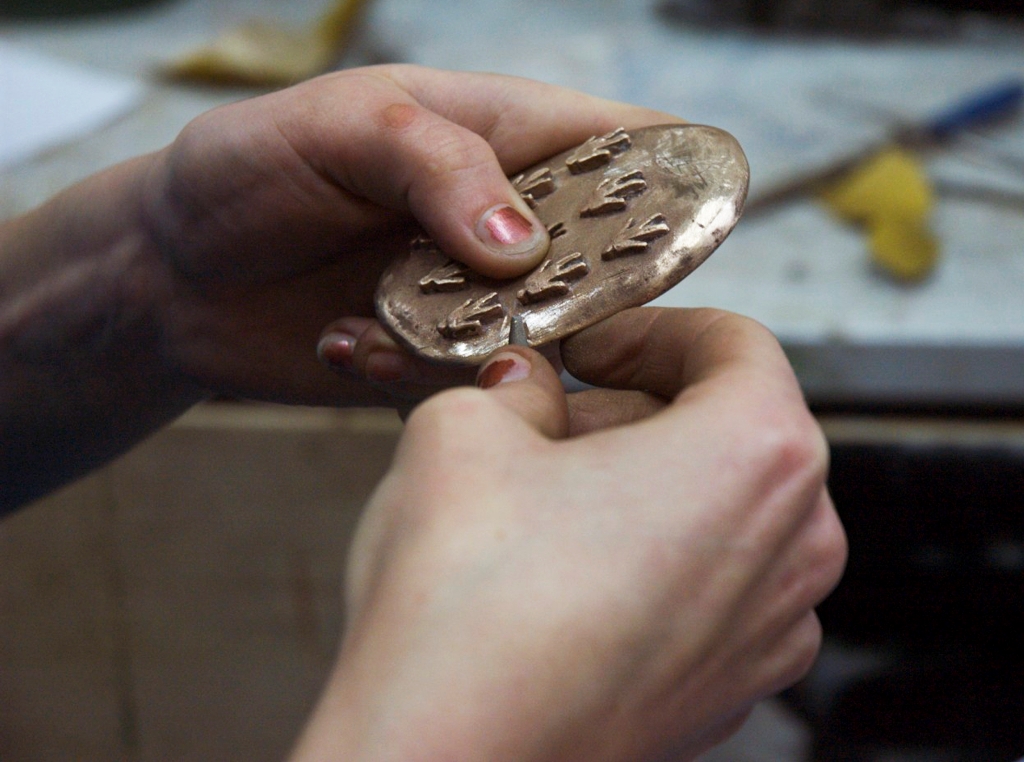
There are two workshops a day and the projects run for a week. In these workshops, family groups arrive to be welcomed to the gallery and meet the artist, a freelance lecturer and assistants. They then go to see the artist’s work in the education gallery and find out about that work, the workshop and how it relates to a specific painting in the collection. The families are taken into the gallery to look at a painting chosen by the artist and to be involved in finding out more about it by discussing the painting with the freelance lecturer.
The artist introduces a drawing brief by looking at the painting, and everyone is encouraged to make drawings and gather visual ideas in front of the painting in the gallery. Drawing in the gallery forms a fundamental part in the formation of ideas to work with in these workshops. Back in the workshops within the education rooms one hundred medals are made after a practical demonstration. Simple!
‘The Art of the Medal – A Self Portrait Medal Project for Schools’ is now available and details of this and artists available to run projects can be obtained by contacting BAMS.
